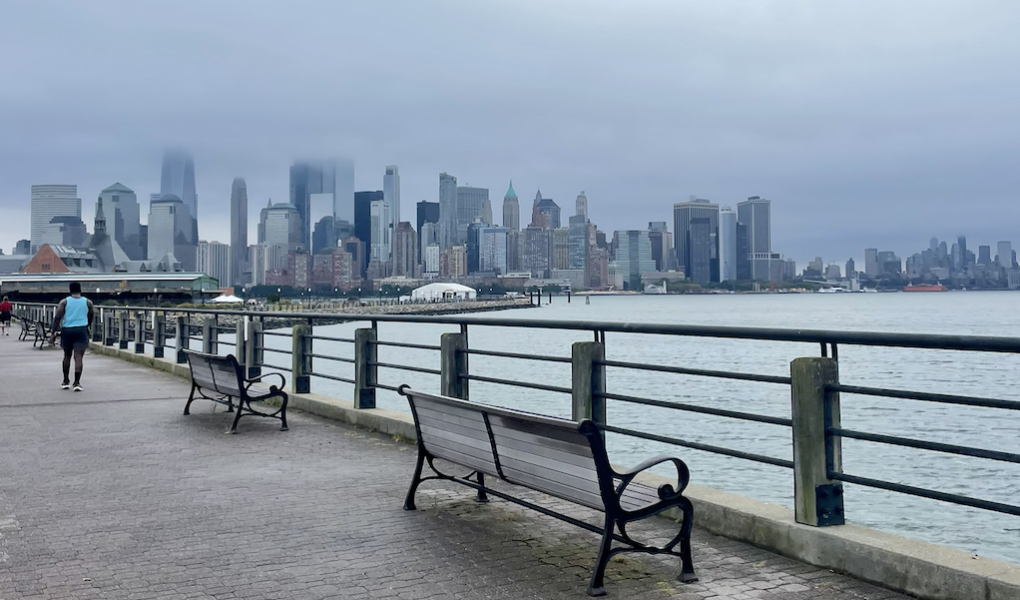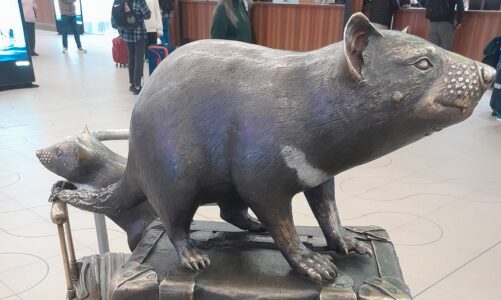When I was twenty years young, trying to keep my eyes open in a dusty state college classroom, a loud-mouthed girl turned around in her desk and asked me for a pencil. She had a deep cupid’s bow and wild, curly hair, and I knew I’d never get over her.
I was an awkward kid. I had long clumsy limbs, wore starchy button-up shirts to class every day, owned all twenty-six volumes of the Encyclopedia Britannica, and had lived two decades without kissing a girl. I would have been deluded to think this radiant girl wanted anything more than the pencil she’d asked me for. I gave it to her and stuttered out a response, and never expected to hear from her again.
I suppose something about me intrigued her. Once the lecture was over, she followed me out of the classroom and tapped me on the arm. I think I responded, but I only remember flushing a deep red. I’d grown up with a single, socially inept father, and I’d never held a full, non-professional conversation with a woman other than my dementia-addled grandmother.
“Your pencil,” she said, handing it out to me.
I came from a long line of Flahertys and McClintocks, and my Irish skin never could hide embarrassment well. I’ve been told that when I blush, everything from my ears to my toes turn red.
“Right,” I said, taking it from her. “I’m Ian. McClintock.”
“Gabby Salinas,” she said. “Nobody introduces themselves with their full name anymore. My father said it goes to show how our generation has killed courtesy and respect. He was always Andrew Salinas, never just Andrew, and certainly never Andy.”
“He sounds like a smart man, Gabby Salinas,” I said.
“He certainly was, Ian McClintock. Passed away last year. Cancer.”
“I’m sorry to hear that.”
And I was, truly, but I was more preoccupied with the question of why this pretty girl would choose to speak to me, and share such a vulnerable fact about herself seconds after learning my name. I was not familiar with people like Gabby, so unafraid of confusion and awkwardness and rejection.
“Thanks,” she said, and placed a hand on my forearm. She wore a silver ring on her index finger, an ornate blue stone settled in the center. It didn’t look expensive—a flea market purchase, perhaps—but it was tasteful. The metal brushed against my arm, and I felt the gentle prickle of goosebumps.
“Yeah,” was all I could muster.
“I’ll see you around, okay?”
The class met every Monday, and every week, I’d spent the next seven days thinking of what I’d do and say when I saw Gabby again. I’d had crushes before, girls in high school I’d have dreams about, but never had I thought about speaking to them in real life. With Gabby it was different—she was real, instead of a character I’d created in my mind. The dreams I had about Gabby were so banal it was laughable. The two of us enjoying cups of coffee or doing dishes or walking hand in hand. It was painfully domestic, and it was beautiful.
It was easy to be obsessed with Gabby—her smile was dazzling, she had such fresh insights about people, politics, and media, she smelled like mangoes and emanated sunlight. What was more confusing is why exactly Gabby chose to speak to me—why she asked for my number and started sending me articles, why she took the time out of her busy, beautiful life to send attention my way.
I never asked her out, of course—even if Gabby wanted to be my friend, I surely wasn’t daft enough to believe she wanted anything more than that. Since I’d known her, she’d told me about unwanted affection from guys that were smarter, buffer, and braver than me, and surely if they weren’t good enough for her, I would never be.
I squashed my feelings for Gabby and started dating another girl, Rebecca. Things developed quickly, and she became my first girlfriend. Gabby and I remained friends, although I was spending more time with Rebecca, and our friendship fell to the wayside.
Rebecca and I were together for about four years. By the time our tumultuous relationship ended, Gabby and I had graduated and gone our separate ways. We remained connected on Facebook, but hadn’t spoken in person in over two years. She became a remnant of my past, and emboldened by the romantic expertise I had gained in my first relationship, I began to date more casually and freely. Still, I never had the courage to confront Gabby about my feelings.
When I was twenty-five, my manager asked me to travel to New York to attend a conference, and I happily obliged—I’d never been to the East Coast, and had a college buddy who was willing to put me up. He’d always been a party animal—even years after graduation, he couldn’t seem to shed his nocturnal lifestyle. I wasn’t the kind of person who fit into this world, but agreed to accompany him just once—I wasn’t averse to having a short fling with a random woman during my week long stay.
I had to be at the conference at eight the next morning, so I opted out of drinking, instead ordering a coke at the bar. The bartender, an woman in her thirties, slid over a plastic cup filled to the brim. The music was loud, I slid over a fiver and waved at her, indicating she should keep the change.
My buddy had made off with some twenty-year-old, disappearing into the crowd, and I stood awkwardly with my coke in the sweaty mass of bodies, closing my eyes and willing myself to melt into the music. I knew nobody was paying attention to me, but I was embarrassed to be alone, twenty-five, and sober in this crowd of underage club goers.
I opened my eyes only after the song finished—and that was when I saw her. It had to be my imagination. Gabby Salinas was at a table, and she was looking right at me. I blinked. Had she been watching me stand there, awkward, for the duration of the last song? The thought was mortifying, and I felt my ears burn up in shame. Luckily, in this setting, I could blame it on the heat.
I made my way over to her. It was too much of a coincidence not to. Here she was, this girl I had been shamefully obsessed with so many years ago, looking entirely the same and yet, entirely different.
Her hair was shorter, curling around the backs of her ears and stopping right below. She had new piercings, one on her nose and two more on her ears, and a tattooed fern twisted up her collarbone and around her right shoulder. I loved that tattoo. It was loud and multi-layered, like Gabby. She wore a black tube top and jeans, and all the bravado and confidence I had gained since I had first met her slipped out of my grasp.
I was suddenly the same woefully awkward boy who had lent her a pencil.
“Ian McClintock,” she said—or I thought she said. She could have just as easily said peel up a thin sock— unlikely, but it was impossible to tell under the bump of the bass. I pointed towards the door, and she nodded her head. We pushed through the wall of bodies together, the cool night air a relief as we spilled out the door.
“Gabby,” I managed, before she pulled me into a bone-crushing hug. She was stronger than she had been in college, her biceps and shoulders visible and defined. I wondered if she’d finally gotten into rock climbing.
“I can’t believe it!” she exclaimed, pulling back to look me in the eye. Her eyes were as large and as dark as I remembered, twinkling under the light of the streetlamps. I used to tease her by calling her Bambi, and the name still fit.
“What happened to you?” she asked, dropping her purse on a bench and sliding next to it. I sat beside her. She was drunk, I could tell. Gabby was never this cavalier about her belongings.
“What do you mean?” I asked, turning to face her.
She rolled her eyes.
“Come on,” she said. “You dropped off the face of the Earth. I haven’t heard from you since college! That Becky had you on a tight leash, you know.”
I bristled, uncomfortable—Rebecca and I had had our issues, but I preferred not to badmouth her to others.
“You know it was true,” she said. “She never let you see me.”
I frowned.
“That’s not true,” I said. “I saw you all the time.”
“Can men really be so oblivious?” she directed the question at me, but it was evident she didn’t want an answer.
“What—” I said, unsure how to respond. “I swear it isn’t true.”
“Really, Ian. She knew I liked you, and you knew it too! I get it, I’d do the same if I were her.”
My jaw fell slack. It wasn’t possible. Brilliant, wonderful Gabby couldn’t have liked me. She would have said something. She’d never have been able to keep it a secret.
“But that’s not—” I said. “What are you talking about?”
“Are you kidding? Ian, all I ever did was complain about other guys, text you all the time, ask you to hang out constantly—I mean, how could I be more obvious? And then you met her, and I realized you’d just taken pity on me the whole time, just kept me around because you felt bad for me! That didn’t stop me trying. So I get it, why she didn’t want you around me. You’re telling me you really didn’t know?”
I gaped at her. I felt like a fish trapped in a too-small bowl, swimming in circles and repeatedly bumping my head into the glass.
“I didn’t see that one coming. Why me? You’re unbelievable. You have this way of making anyone feel seen. You’re incredible, and I was obsessed with you. And I suppose I thought you’d never want to be with someone like me.”
“Someone like you?” Gabby said. She stood up and brushed off her jeans. “What does that even mean? I’ve never met anyone I’ve cared about as much. You’ve always been so self-deprecating. You fail to see everything good about yourself. And if after all this time, you still don’t believe yourself capable of being loved, I really don’t know what I’m still doing here.”
“Gabby—”
“You’re so beautiful,” she said, and my throat went dry. I’d never heard those words before, from anybody. “I mean it. I wish you knew that.”
“Gabby—”
“Ian, please. Enough. I’ve spent this long getting over you, and I’m not getting sucked right back into it again.”
She waved her hand, and a yellow cab pulled over. She climbed into the back, and it sped off.
Next to me, her purse lay on the bench. I grabbed it and chased after the cab, but the driver turned left, and they were gone.
I knew I had to get the purse back to Gabby, but I was still reeling. I couldn’t think straight. I couldn’t believe strong, confident, otherworldly Gabby Salinas had pined after me the same way I had for her. It didn’t seem real. She was always so vocal, so loud about her feelings. But maybe, she’d told me all those things about other guys to wake me up. To snap me out of my self-pitying haze. And when I hadn’t responded to it, she assumed I didn’t feel the same way.
Meanwhile, I kept my feelings hidden out of pure cowardice.
How could I have been so dumb?
I thumbed through Gabby’s purse for her driver’s license, hailed a cab, and directed it to the address. I had no idea what I would say or do, and as the car sped through the city, a sick feeling enveloped my heart. There was too much to figure out. Too much baggage to sort through. But I had Gabby’s purse, and there was no better way to return it to her.
The cab finally dropped me off outside Gabby’s apartment building, a four story walk-up in the Lower East Side. She was still outside, arguing with her cab driver. About the fare, I presumed. She ignored me at first.
“Hey,” I called, after paying my cab driver. “You left your purse.”
“Oh!” she ran over to me, grabbing it from my hands. “Thank you, thank you.”
Gabby sorted things out with the taxi, and once he’d sped away, she turned back to me.
“That was nice of you,” she said. “You didn’t have to.”
“I did.”
We stood there, staring at one another. In her eyes, I saw the possibility of another life. One where I hadn’t been a coward, and I’d asked her out that first day, right after she returned my pencil. A life where the last five years could have been filled with constant laughter instead of fighting and loneliness.
“Ian—”
“Marry me,” I blurted, and it was ridiculous, but I meant it. I’d never been more sure of anything.
“What?” she laughed. Her hand flew up to her forehead. “You’re joking, right?”
“I’m so serious,” I said, and I suppose she understood, because the smile faded off her face. She stood there, mouth open, every bit as dumbfounded as I had been outside the club. I should have been embarrassed, but I wasn’t. I had never felt that sort of conviction in my life. It felt empowering, like lightning running up my arms.
“Oh my God,” she said, covering her eyes. “This can’t be real.”
“It’s real,” I said, reaching up and peeling her hands away from her face. “I mean it. Marry me, won’t you? I’m tired of missing you. I’m tired of wishing things were different.”
“Okay. Yes, I—I’ll marry you!” she said. “I’m dreaming. I’m dreaming.”
Nothing that came before mattered. That was the beginning of my life.
Gabby lived in New York, I was in Denver. That complicated things for the first few months. But my company had a New York office, and I was able to put in a transfer. We didn’t waste time. We were done wasting time. We were married shortly after, a small ceremony. Ninety percent of the guests were hers, of course.
We had our son, Andrew, a year after. He’s named after Gabby’s father. He was born with ten beautiful fingers and ten beautiful toes. He has Gabby’s dark, curly hair and my love of books. He still can’t read, but I’ll catch him thumbing through the pages of our coffee table books lovingly, and I know the kind of kid he’s going to grow up to be.
I look out at him from the podium, playing with a toy school bus. He’s tucked under Gabby’s mother’s arm. I clear my throat and turn back to the hand-written speech in front of me, the ink smearing under the scattered teardrops.
“You all might think that our story didn’t have a happy ending,” I say, taking a deep breath. “But that isn’t true. Even the nights in the hospital, the times when everything was touch-and-go, every second I had with Gabby was special. Even the fights. The truth is, when you love someone, every single second is precious. Gabby and I knew that. We’d spent so many years not communicating with one another, that the few years we did have were unbelievably special. Even now, I wouldn’t trade it for the world. I’m sure if Gabby were here instead of me—and God, I wish that was the case—she’d say the same. Until the cancer came along, we had a beautiful, boring, domestic life together—and then suddenly it wasn’t beautiful, it wasn’t boring, it wasn’t domestic, but it was certainly our life, and we certainly lived it.”
I look up from the podium, out at our family, our friends, our son. I smile at him, and he waves at me. He’s too young to understand what’s going on, and that breaks my heart. He won’t remember Gabby, her radiant smile and big eyes, her printed dresses and the silly, made-up songs she sang.
But she lives on through him, and I suppose I do too.
I always used to wonder why Gabby loved me. But my son is just like me, clumsy and quiet and crooked-smiled, and I love him for it. I love him without hesitation, and I suppose Gabby did the same for me. I understand, now, why I was loved.
I am grateful that I carried an extra pencil when I was twenty. I am grateful I got over my cowardice and went after what I wanted.
My wife is lain to rest.
I am grateful that I waited for her.
This story was inspired by the Reedsy.com prompt “Write a story that includes the line, “I didn’t see that one coming.”




